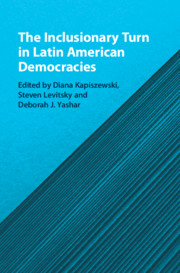Book contents
- The Inclusionary Turn in Latin American Democracies
- The Inclusionary Turn in Latin American Democracies
- Copyright page
- Contents
- Figures
- Tables
- Contributors
- Acknowledgments
- Prologue: Reflections on Two Episodes of Popular Inclusion
- 1 Inequality, Democracy, and the Inclusionary Turn in Latin America
- Part I Extending Social Policy and Participation
- Part II Inclusion and Partisan Representation
- Part III New Party–Society Linkages
- 9 The Politics of Popular Coalitions
- 10 After Corporatism
- 11 Expanding the Public Square
- Part IV Inclusion, Populism, and Democracy
- References
11 - Expanding the Public Square
Evangelicals and Electoral Politics in Latin America
from Part III - New Party–Society Linkages
Published online by Cambridge University Press: 12 January 2021
- The Inclusionary Turn in Latin American Democracies
- The Inclusionary Turn in Latin American Democracies
- Copyright page
- Contents
- Figures
- Tables
- Contributors
- Acknowledgments
- Prologue: Reflections on Two Episodes of Popular Inclusion
- 1 Inequality, Democracy, and the Inclusionary Turn in Latin America
- Part I Extending Social Policy and Participation
- Part II Inclusion and Partisan Representation
- Part III New Party–Society Linkages
- 9 The Politics of Popular Coalitions
- 10 After Corporatism
- 11 Expanding the Public Square
- Part IV Inclusion, Populism, and Democracy
- References
Summary
The transformation of evangelical Christians from a discriminated-against minority to full citizens with rights and political influence constitutes an important component of the inclusionary turn in Latin America. In some countries, this process of inclusion has translated into a formidable presence in elected office, with evangelicals leading a socially conservative backlash against progressive policy agendas. In other countries, evangelicals have little presence within the halls of power. This chapter seeks to explain differences in evangelicals’ involvement and success with electoral politics in Brazil and Chile, South America’s two most heavily evangelical countries. Rejecting arguments that focus on external barriers, such as social discrimination or constraints posed by political institutions, I instead emphasize the historical process by which a religious identity is or is not politicized, via struggles for legal equality with the Catholic Church and more recent battles over abortion and same-sex marriage. In Brazil, ongoing threats to evangelicals’ core interests and identities, combined with opportunities to defend against these threats via legislative politics, have produced a much more politicized and electorally successful evangelical community than in Chile.
- Type
- Chapter
- Information
- The Inclusionary Turn in Latin American Democracies , pp. 362 - 398Publisher: Cambridge University PressPrint publication year: 2021
References
References
Author’s Interviews
Barrientos, Jaime. Valparaíso, Chile, Jan. 19, 2015.
Contreras, Leonardo. Valparaíso, Chile, Oct. 25, 2017.
Cooper, Alfred. Santiago, Chile, Jan. 20, 2015.
Durán Sepúlveda, Eduardo. Santiago, Chile, Oct. 27, 2017.
Gómez, Evelyn. Santiago, Chile, Oct. 25, 2017.
Larrondo, Abraham. Santiago, Chile, Jan. 15, 2015.
Muñoz, Francesca. Concepción, Chile, Jan. 14, 2015.
Muñoz, Héctor. Concepción, Chile, Jan. 14, 2015.
Pérez, Rosario. Valparaíso, Chile, Oct. 25, 2017.
Roldán, Eddy. Santiago, Chile, Oct. 23, 2017.
Soto, Emiliano. Santiago, Chile, Jan. 22, 2015.
Valenzuela, Samuel. Santiago, Jan. 19, 2015.
- 1
- Cited by



